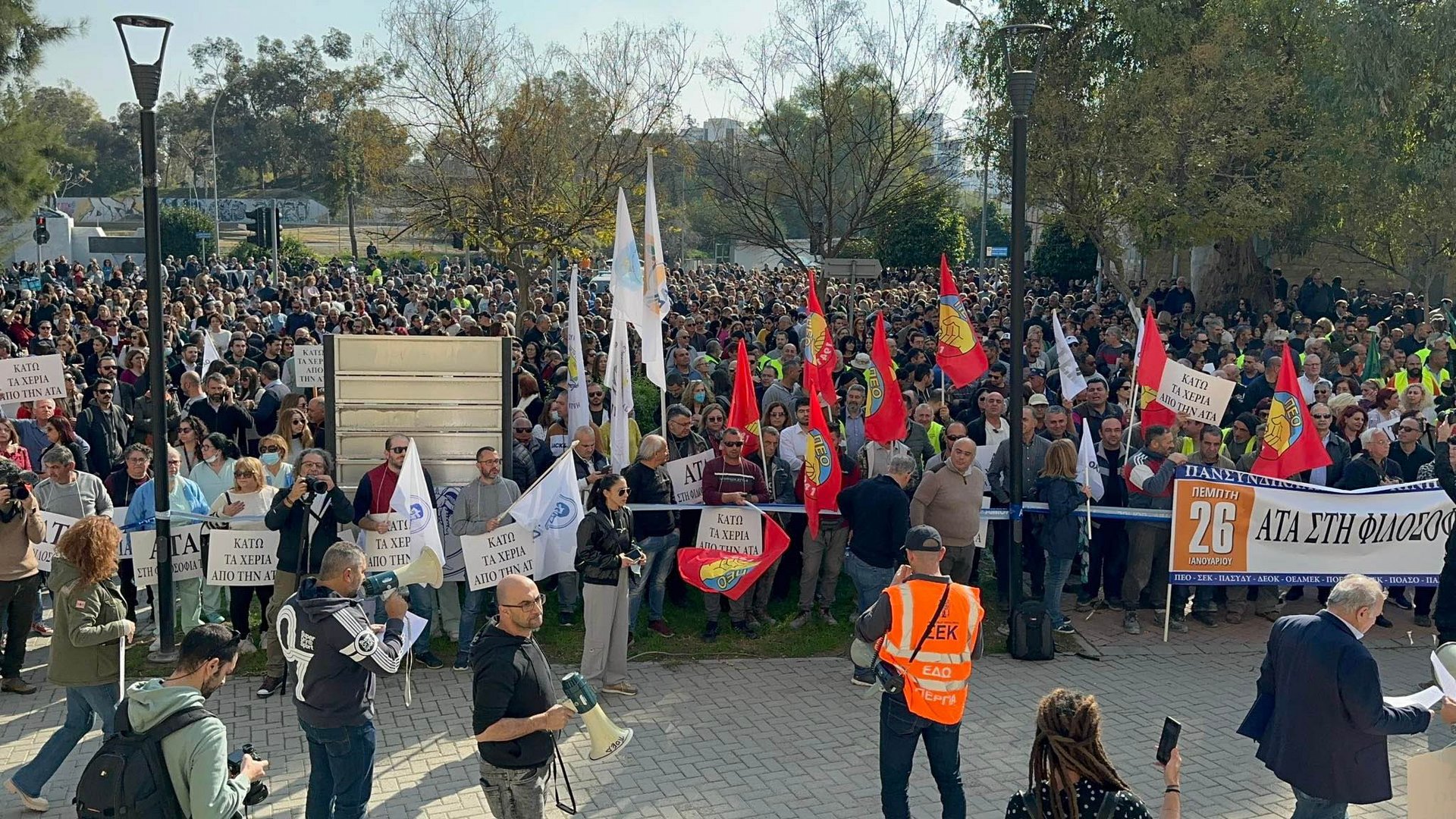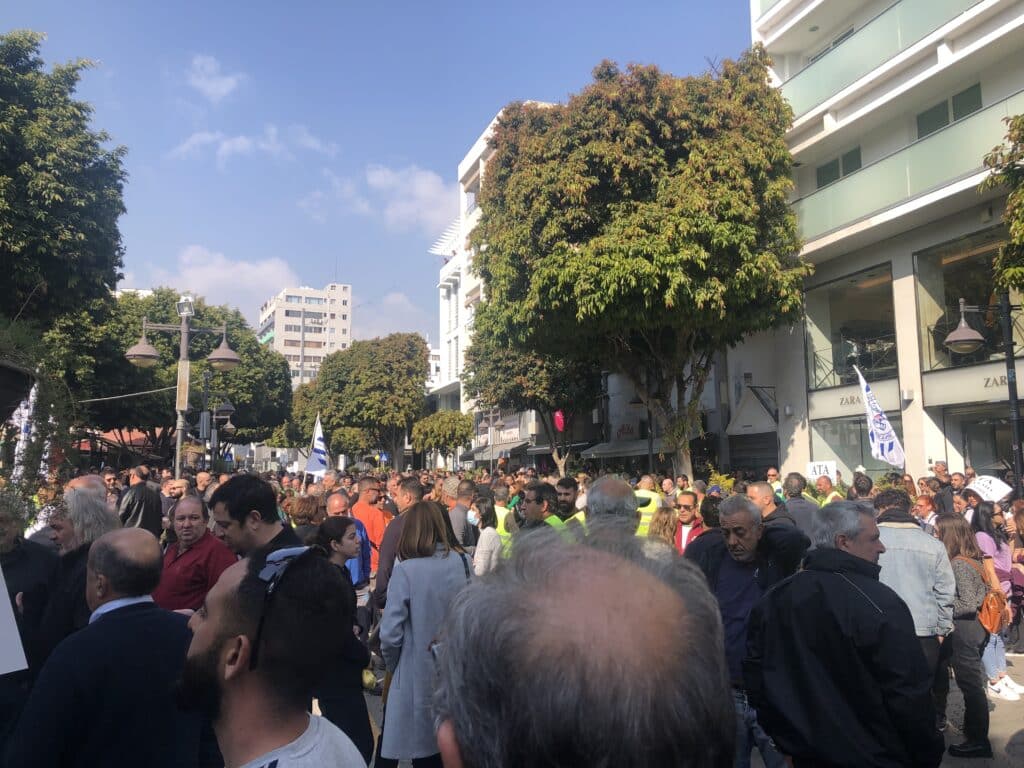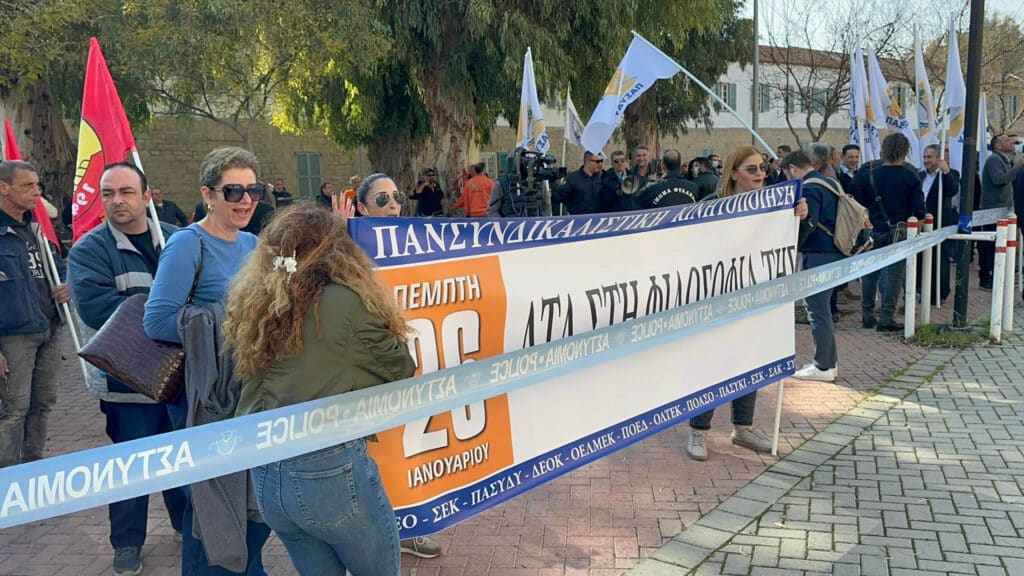Cyprus came to a standstill on Thursday as thousands of workers across all sectors went on a three-hour islandwide strike over an impasse between the government and unions on full restoration of the cost-of-living allowance (CoLA).
The message was that unions were not willing to yield. CoLA was a hard-won right that workers were not willing to give up, they said, even if they had to engage in further measures. Currently, employees who receive CoLA get 50 per cent of the rate as part of measures dating back to the financial crisis in 2013. Unions want it restored 100 per cent as promised but say they are willing to see this done in increments over the next three years.
Following the recent failed talks between unions and the labour ministry, the workers began striking at 12 noon and ended it at 3pm. The strike affected almost every sector, ports, airports, schools public transport, media and the broader public service among others. Unions in Cyprus cover about 70,000 workers across the public and wider public sector and 40,000 workers in the private sector.
During the start of the Nicosia protest, the biggest of those in the main towns, which began at the finance ministry, union leaders spoke about the importance of reinstating CoLA. Police in Nicosia had shut down roads in the centre of the capital, near the government buildings.
The head of the Sek union Andreas Matsas said: “We do not negotiate workers’ rights. Today the credibility and dignity of workers is being judged. The fight is not just for CoLA, but more generally about workers’ rights.”
Also speaking, the general-secretary of the public sector union Pasydy, Stratis Matthaiou said that in the days before the strike, the unions had tried to reach an agreement with the government about restoring CoLA, but that their proposal was shot down.
Meanwhile the head of the journalists’ union, George Frangos said that the restoration of CoLA is “just the tip of the iceberg” for them.
He said: “I represent the journalists of our country, who daily write and present on workers’ rights, union demands, and the claims of all other workers, but they cannot themselves speak about their own wants.”
Frangos said that the reintroduction CoLA creates the conditions for a renewal of collective contracts. “It paves the way for a drastic rise in trade union consciousness, and trade union rallying of all employees,” he said.
In her comments, Peo union general secretary Sotiroulla Charalambous said: “Today, all over Cyprus, we, the workers, are defending our history. We are defending our present and future. We are defending the struggle of those colleagues that gave us CoLA in 1944”. She added that this was a fight for the future of the children in Cyprus. “We will not surrender CoLA or collective agreements,” she said.
Charalambous said that the fight for CoLA was also a fight for collective agreements, because employers were trying to abolish these types of agreements and establish only individual contracts.
People marching the streets on Thursday were heard shouting “Hands off CoLA!” and “CoLA for all workers!”
After discussions between the unions and Labour Minister Kyriacos Koushos fell apart, Koushos said that the CoLA issue would be a problem for the next government. Elections are set to be held on February 5.
In Larnaca workers gathered outside the district office where the district secretary of Peo, Giorgos Iulianos said there would be no compromise.
“We do not accept the narrative of those who say that because not all workers receive CoLA, it should be abolished,” he said.
“Workers were disproportionately burdened by successive crises and now that the time has come to take back what we are entitled to, what was cut from us, we face not only the denial of the employer’s side but they’re also discrediting us. We are not the ones who backtracked on our commitments.”
Demonstrators also packed into central Limassol and in Paphos, the protest was held outside the district offices. In Paralimni it was held outside the welfare offices. Union officials in all towns echoed their Nicosia counterparts.
In Limassol, Paraskevi Koupari, on behalf of the public service union Pasydy said the position of the employers was “completely untenable”.
“Without showing any respect for what was agreed upon, they insisted on our remaining in the current regime. Their obvious goal was and remains the degeneration, undermining and complete abolition of CoLA,” she said.
Following the gathering at the finance ministry in Nicosia, the strikers marched to the labour ministry to hand a petition to Koushos who was handed a petition by union reps, which said workers were disappointed because the employer’s side, throughout the dialogue maintained “an unyielding and uncompromising attitude”. They also constantly promoted the position for the abolition of CoLA, which would lead to a serious deregulation of collective agreements, the resolution said.
Unions said that they were also disappointed in the government, as the state failed to submit an interim proposal and that they planned to ensure that collective agreements were extended to 80 per cent of the working population. The unions also said they could not accept the current administration offloading the issue to the next government.
In response Koushos said: “The strike is an unwarranted and unwanted development. However, I do not accept the position that the government has any responsibility in the matter.”
He added that the government can also not “force” employers to give CoLA, so it was impossible to submit an interim proposal.
“The government does not have legal standing to interfere in the freedom of contracts the social partners [unions and employers],” he said.
Koushos added that the government was very clear in its statements about CoLA, and that President Nicos Anastasiades himself had said the government was against its abolition and had only suggested it be returned gradually.
About accusations that the government was leaving the issue until after the elections, Koushos said that this was “completely wrong” as the current government was the one that started to mediate this issue between employers and unions in October.
On their part, employers’ organisations have said the current period of economic instability did not lend itself to meaningful negotiations and asked for the continuation of discussions on a more holistic, modern and more efficient system.
Outside of the protests, a total of 22 flights were affected to and from Paphos and Larnaca airports, the majority of which were rescheduled with operations back online from 3pm when the strike ended.
The ports authority had also taken all necessary steps to ensure security at the port. The strike also affected local, rural and intercity buses and school buses. Media outlets also be participated, with websites going dark for three hours other than reporting on the strike. Judges, and some hospital staff also went on strike, citizens’ advice centres closed. Emergency services for electricity, healthcare were not affected as they operated with skeleton staff but scheduled appointments were cancelled. Post offices and municipalities were also closed.









Click here to change your cookie preferences